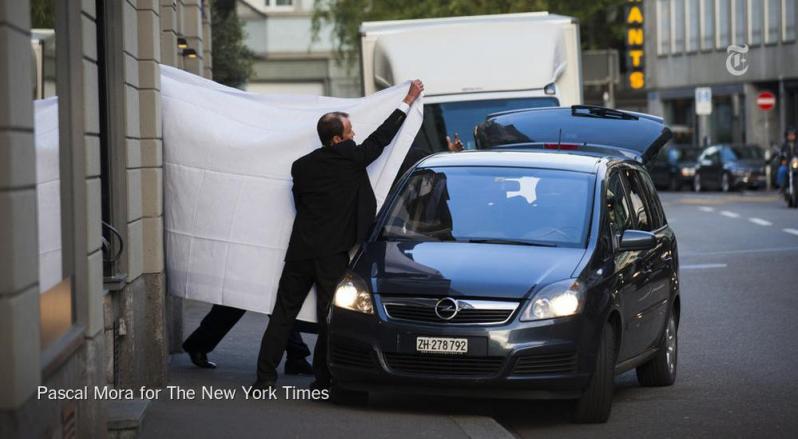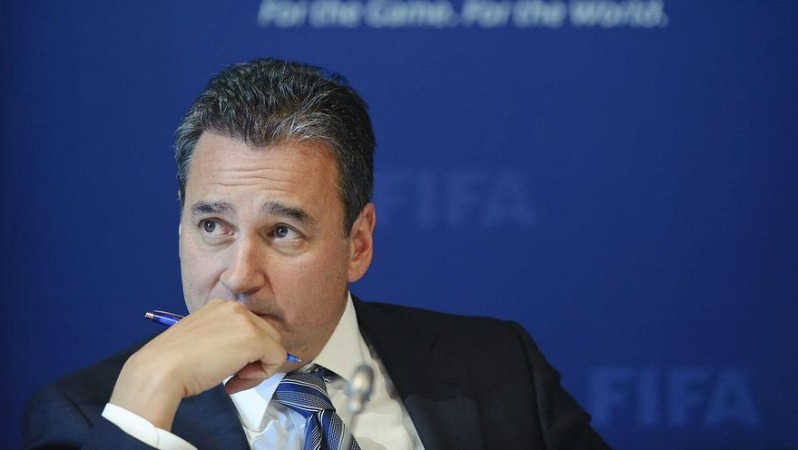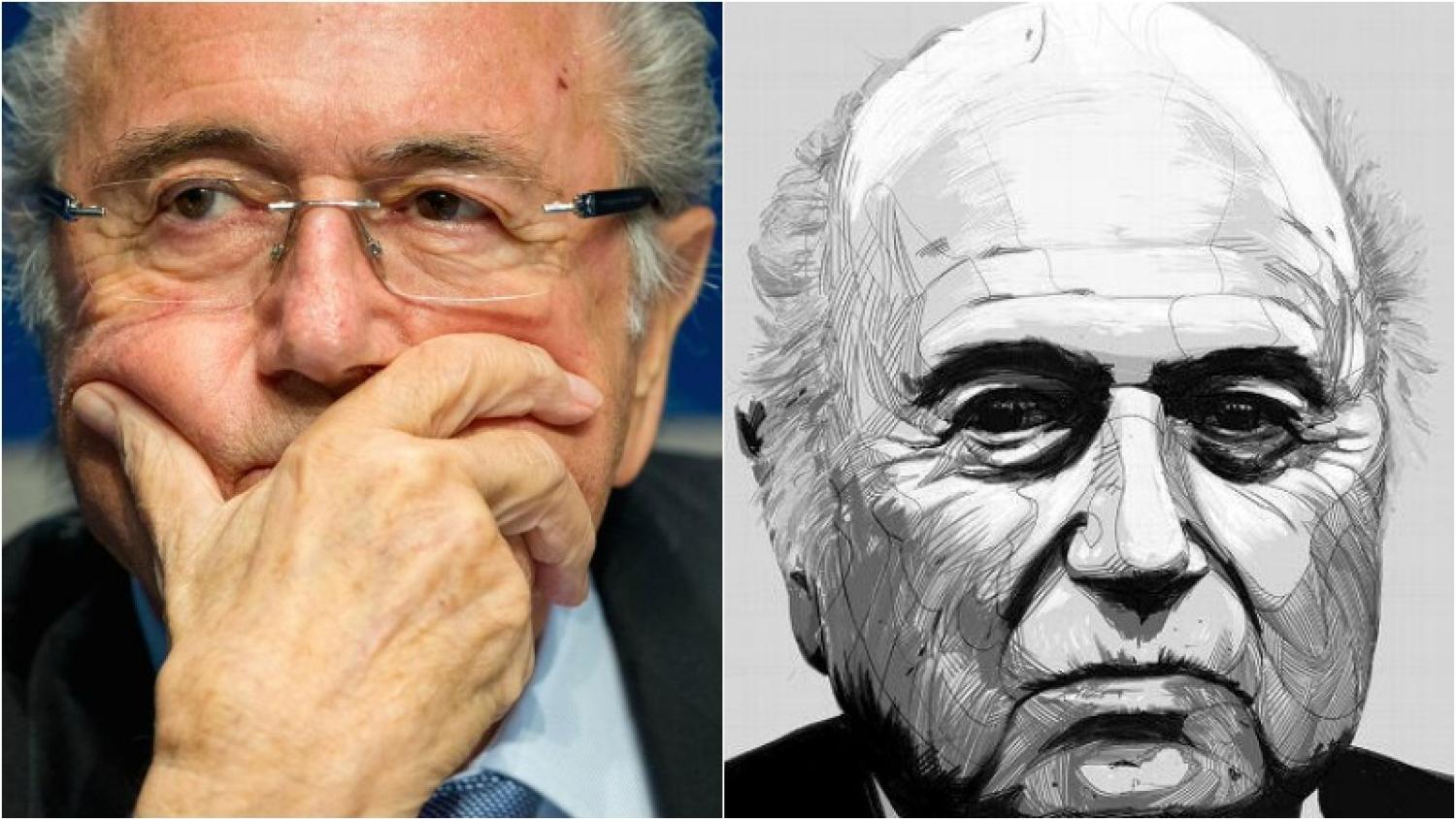Looking back on what has happened in the past 24 hours is a vertigo inducing experience.
Just yesterday the world was operating under the ostensible facts that:
- Sepp Blatter would be “elected” to another 4 year presidential term on Friday.
- It would continue its dreaded march toward the 2022 World Cup in Qatar, down a path lined with the dead bodies of modern day slaves. A World Cup so controversial that it had, for all intents and purposes, pushed a World Cup awarded to Russia, of comically villainous standing, to the side of the world’s collective psyche.
- And that its most beloved game would generally continue to be associated with all things corrupt until the end of time.
And people cynically accepted these things as truths that they could not fight. There was too much money, too much power, too much politics at play for anything as novel as “morality” or “the common good” to come into play and exact any real change. And now?
9 FIFA officials and 5 sports and marketing executives have been indicted by the United States Department of Justice (DoJ) for charges including racketeering, wire fraud and money laundering conspiracy; it’s investigation will be aided by the FBI and IRS. Those 14 face extradition by the Swiss government to the United States. The Swiss Office of the Attorney General has filed its own investigation into the allocations of the 2018 and 2022 World Cups in Russia and Qatar, and will cooperate with U.S. authorities as it pursues its investigation. Sepp Blatter can’t leave Switzerland. UEFA has called for a postponement of the FIFA Presidential election due to take place on Friday. The FBI has raided CONCACAF headquarters in Miami, Florida.

An arrest taking place in Zurich, Switzerland. Photo: @nytimes | Twitter
The list goes on and on, and it is filled with things thought to be, if not impossible, then relegated to the realm of charmed possibility.
“This is the World Cup of Fraud and today we are issuing FIFA a red card,” said IRS chief of criminal investigations Richard Weber. Apparently a charmed life is ushered in by dad jokes.
Weber’s statement was a welcome moment of levity in what was a day defined by shocking change, and it is as good point at which to take a step back and appreciate the scope of the fight against corruption in FIFA.
The events of today are a brilliant start, but they are no more than that. This fight is no where near over, U.S. officials have made that much clear. And, if the words of indictee, and former vice-President of FIFA, Jack Warner are to be taken seriously, they will be fought every single step of the way.
It is uplifting to see the DoJ commit to the cause, because anything less than the ousting of Blatter and the stripping of the 2022 World Cup from Qatar would be a victory for corruption.
As of right now, FIFA and Blatter have successfully distanced themselves from any wrong doing, while simultaneously welcoming and hailing both the Swiss and American investigations as good things. FIFA’s Director of Communications and Public Affairs, Walter De Gregorio, speaking on behalf of FIFA, said that the organization “is the victim” and that the investigations are “good…in terms of cleaning up” FIFA. Blatter echoed these sentiments in a written statement that was released later.
Complicating the situation further is the fact that the Swiss investigation was apparently launched back in November of 2014 at the request of FIFA, itself. A twist in the story that brings up more questions than it answers. FIFA may have known nothing about the DoJ investigation and/or subsequent indictment, but the fact that it initiated the Swiss investigation into the 2018 and 2022 World Cups suggests that FIFA is in greater control of the situation than the events of today might lead one to expect.
At this point, it must be firmly established that there are two separate, but cooperating, investigations that are taking place:
- The Swiss investigation into the allocation of the 2018 and 2022 World Cups in Russia and Qatar, respectively, which inherently involves FIFA, and which was started after FIFA filed charges against “persons unknown.”
- The investigation of the DoJ into allegations of racketeering, wire fraud and money laundering conspiracy — among other charges — by the 14 named in the DoJ indictment.
FIFA, and hence Blatter, knew about the Swiss investigation because they started it, but it seems as if the arrests in Zurich on Wednesday caught it off guard. At least, that is what De Gregorio alluded to when he said that he “would have gone to sleep earlier” the night before had he known that the arrests were going to take place. But, again, there is evidence that FIFA was far more prepared than one might originally think.
The DoJ might not be explicitly investigating Russia 2018 and Qatar 2022 right now, but it is undoubtedly a target in the future. The FBI has been investigating FIFA corruption since 2011. United States attorney Kelly T. Curie of the Eastern District of New York, the district carrying out the aforementioned DoJ investigation, said “this is the beginning of our effort, not the end. We are looking into individuals and entities in a variety of countries.” The director of the FBI, James B Comey, concurred when he said that the U.S. is pursuing “a very aggressive prosecutorial response in order to change behavior [in FIFA].” The road ahead is leading to something bigger, and that something is surely an investigation into the 2018 and 2022 World Cups.

Workers at a stadium worksite in Qatar, where working conditions have been inhumane. Photo: @mathiaswasik | Twitter
The World Cup is the single biggest bread winner that FIFA commands; it is what really matters. Brazil 2014 generated $4 billion for FIFA, and that is just the legitimate money, there is no way to know about what kind of capital FIFA gained, or how much it increased its cash flow, with under the table deals. Allegations have already come out that at least $10 million traded hands illegally in order to secure the 2010 World Cup in South Africa, and that’s just one example. There is no telling how much money, legitimate and illegitimate, FIFA has made or will make off of Russia 2018 and Qatar 2022, should they take place.
FIFA knows that short of all out war, the only thing that can take away the World Cup is legal action. For example, an investigation into the allocation of a World Cup, the likes of which is currently being carried out by the Swiss, could lead to the stripping of a World Cup from a country if, for instance, corruption was uncovered. This could lead to FIFA losing a lot of money; sponsors like Adidas, Sony, and Visa are not going to be willing to pay nearly as much as they normally would to have their name plastered over “The Corrupt World Cup.”
In order to make sure that FIFA isn’t brought down by corruption charges — accusations of which have been thrown at the organization for years, but never with any real legal might — FIFA is no doubt familiar with international law concerning corruption. And with the legal insight that $1.5 billion in cash reserves can buy, FIFA would know that the United States has immense power to extradite foreigners and investigate foreign organizations for corruption under The Foreign Corrupt Practices Act, and it would also know that this power is limited by a Statute of Limitations that says that any investigation must be started within 5 years of any suspected violation.
The simplification of all that legal jargon is this: The United States has to begin an investigation into a foreign corruption violation within 5 years of it happening, or else it has no power over the matter. There are extenuating circumstances, but that’s the gist of it.
Russia 2018 and Qatar 2022 were awarded on December 2nd, 2010 (so that’s the date of the “suspected violation”) both FIFA and the United States know this. They also both know that those two tournaments represent the best way to hurt FIFA. If we can read anything into the aforementioned words of Curie and Comey, it is that the United States wants to target bigger fish, an ambition that FIFA is aware of, and that threatens its precious World Cups. So, tying this all together, FIFA knows that if the United States were to investigate the 2018 and 2022 World Cups, then it would have to do so before December 2nd, 2015. FIFA was vulnerable, and it had a vague idea of when it might be attacked.

Michael Garcia, author of the Garcia Report. Photo: @Alakbarov_ | Twitter
FIFA has long taken a prideful, almost cocky route when it comes to dealing with its own corruption, and defending itself in general. Just in this past year, FIFA carried out an internal investigation into its own corruption, specifically concerning accusations over the allocations of the same 2018 and 2022 World Cups. That internal investigation produced the infamous Garcia Report. As if the conflict of interest involved in a self-investigation into corruption wasn’t blatantly aloof enough, FIFA only released a summary and a redacted version to the public. The release of the summary was met with widespread criticism.
The summary of the Garcia Report was released on November 13th, 2014. Later that day, the FBI announced it would move with it’s own investigation, the one mentioned earlier in this article. 5 days after the release of the summary of the Garcia report and the FBI’s announcement, on Novemeber 18th, 2014, FIFA filed its charges to the Swiss government concerning “persons unknown,” the same charges that initiated the Swiss investigation into the 2018 and 2022 World Cups.
The timing of these events can lead to the conclusion that, in the aftermath of the backlash of the Garcia Report and the news of the continuation of the FBI investigation, FIFA realized it needed to protect itself against an investigation from outside its walls. In an attempt to do so, FIFA may have filed charges, against “persons unknown” within FIFA, to the Swiss government. This would have been a preemptive act, a preventative legal action akin to fighting fire with fire. FIFA may have initiated an investigation that it had full knowledge of in order to weed out the “legal loose ends” present in its organization that could have potentially brought it down should a real, radical investigation come around. The kind of investigation of which the United States is capable of carrying out, and the kind of investigation that FIFA knew could hurt it most.
FIFA may have thought of the Swiss investigation the way parents think of letting their children play with a classmate with chicken pox: they deal with the pain and discomfort now, in order to not suffer far more in the future. It did not know for a fact that it would be involved in an investigation carried out by DoJ, but it did take the exact precautions one would take in order to make such an investigation far less damaging. FIFA may well have known the events of Wednesday, the 27th of May, 2015 were going to happen well before they did, even if it did not know the “who or when.”
A month after FIFA filed its charges to the Swiss government, Michael Garcia resigned from his position at FIFA, stating that “no independent governance committee, investigator, or arbitration panel can change the culture of an organization."
The fight against corruption in FIFA is far from over. Sep Blatter, as wounded as he might appear now, is still the President of FIFA, and as long as that is the case, FIFA will likely be corrupt. Blatter has taken precautions to insulate himself from events just like the crackdown that occurred on Wednesday, and he and his organization have said all the right things in its aftermath.
As he was speaking for FIFA, De Gregorio was asked to describe Blatter, he said his leader was “relaxed…because he knows he is not involved.” A politically savvy response — Blatter has shown nothing but acceptance for both investigations — but a show of confidence none the less. The confidence of a man that has grown used to playing in the shadows.
Follow Ivan on Twitter: @yetly

 Home
Home
